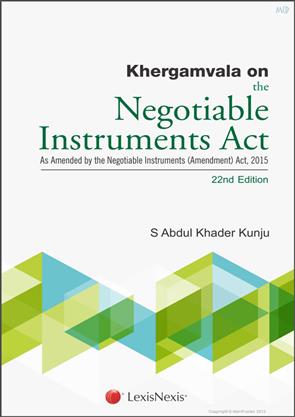The Negotiable Instruments Act
no information available
The Negotiable Instruments Act, 1881 was enacted to regulate the traditional usages and practices prevalent among the mercantile community in India. Khergamvala on Negotiable Instruments Act has been a celebrated title among the bar, the bench and the academics since its publication in the early part of the last century. The economic globalisation and developments in the banking sectors necessitated changes in the concepts of law relating to negotiable instruments. The introduction of Chapter XVII by the Act 66 of 1988 on the penalties in the case of dishonour of cheques was made with a view to achieve this change. Thereafter, the rigour of penal provision became more intensive by the introduction of Act 55 of 2002, the persons who initiated such prosecution started facing their bad patch as the courts in India adopted new standards when they experienced that many of such cases were launched by the modern Shylocks. This edition of Khergamvala on Negotiable Instruments Act, based on various case law, examines how the desired objects of this Act can be achieved. The extent of the presumptions under the Act, the pre-conditions for raising such presumptions, its probative value and the manner in which rebuttal evidence can be let in are somewhat puzzling concepts. In this edition, apart from updating the law with recent amendments and latest judgements, a summary is given based on an in-depth analysis of various judicial pronouncements on the concept of execution of negotiable instruments. This book will be a useful practical guide for lawyers, judges, litigants, students, researchers, and all those associated with the banking sector. ... Read more Read less











